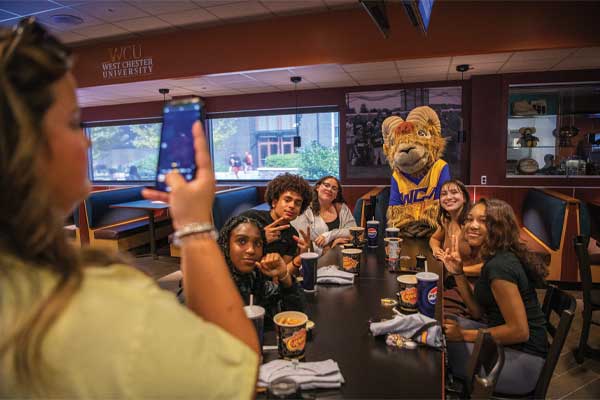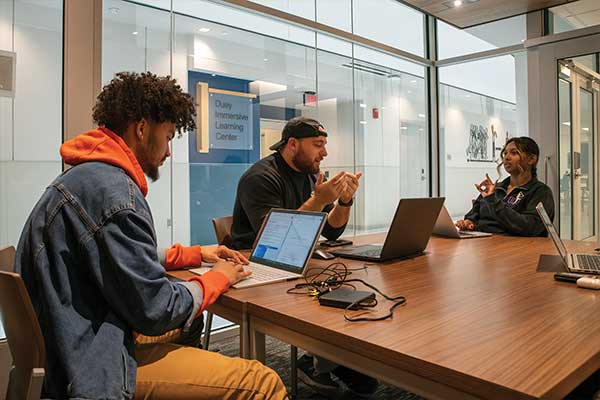
FACULTY PROFILE

Dr. Oné Pagán
Dr. Oné Pagán Shares Passion for Science Through
TEACHING, RESEARCH, AND WRITING
Biology Professor Oné Pagán describes himself as “an unapologetic science nerd.”
“I love anything and everything about science,” Dr. Pagán says, his broad smile adding credence to his statement. “I always tell my students that I have the perfect job for me.”
As a first-generation college student in his native Puerto Rico, Dr. Pagán earned a bachelor’s degree in natural sciences and a master’s degree in biochemistry. He was a non-traditional student in his late 30s with a family to support when he came to the United States to earn his doctorate in pharmacology at Cornell University. A recruiter from the Ivy League school visited the Universidad Central del Caribe medical school where Dr. Pagán was teaching and working as a laboratory technician and offered him a full scholarship.
It’s easy for a scientist to write a paper that will be read by other scientists. I attribute my experience in Bio 100 with giving me the little spark that made me start writing popular science books.
He revels in his interdisciplinary background. “As I tell my students, science does not exist. Nature does and we invented science to divide nature into manageable chunks so we can understand it. So the best science is interdisciplinary,” Dr. Pagán declares. His diverse background enables him to teach Biology 100, the introductory course for non-science majors, while also teaching pharmacology, astrobiology, and other specialized courses to majors in biology, nursing, and pharmaceutical product development.
His personal experience allows him to encourage WCU first-generation college students majoring in science. He takes special interest in sharing career options. “There are so many careers out there in the sciences that they can choose from,” says Dr. Pagán, who is listed in The Atlas of Inspiring Hispanic/Latinx Scientists. “Most of the time they are not aware that they can engage in scientific research at the college level.”
Students are invited to work with him in his lab where research focuses on planaria, the flatworms that possess the ability to regenerate lost body parts. With a neurotransmitter system and brain chemistry similar to vertebrate mammals, Dr. Pagán says they are ideal for pharmacology research. “We use them as models to try to come up with strategies to minimize or even prevent toxicity from abused drugs,” he explains. Other experiments use planaria to gauge the toxicity of pesticides in water. Another aspect of his research focuses on planarias’ regenerative ability.
Planaria were the focus of Dr. Pagán’s first book, The First Brain: The Neuroscience of Planarians (Oxford University Press, 2014). A second edition will be published in 2025. It was Dr. Pagán’s classroom teaching, not his research, that inspired his next two books. They bear the provocative titles Drunk Flies and Stoned Dolphins: A Trip Through the World of Animal Intoxication (2021) and Strange Survivors: How Organisms Attack and Defend in the Game of Life (2018). Both books, published by BenBella Books, were written to introduce fascinating scientific information to a non-science audience.
“It’s easy for a scientist to write a paper that will be read by other scientists. I attribute my experience in Bio 100 with giving me the little spark that made me start writing popular science books,” Dr. Pagán explains. “I had to teach people from all over the University – non-science majors. To get their attention, I oftentimes brought tidbits of information, such as a curious thing that somebody discovered about a particular animal, and I tried to incorporate it in my class. I started with ‘Did you know that this animal did this?’”
One such anecdote about the behavior of male fruit flies made its way into Drunk Flies and Stoned Dolphins. “When they are rejected by a female they prefer fermented fruit over fresh fruit,” Dr. Pagán says, drawing a parallel to a human male’s tendency to drown his sorrows with a fermented beverage during a romantic breakup. “It is a very important lesson that we are not so different from animals.”
More from the Fall/Winter 2024 Issue
News
iCamp
Seventh season of free summer media program
WCU Basketball Court
Honoring Coaching Legends
WCU Football Field
Named in Honor of Distinguished Alumni
Profiles
Donor:
Justamere Foundation
Alumni:
Marc McMullin ’95
Student:
Jude Bourdeau




